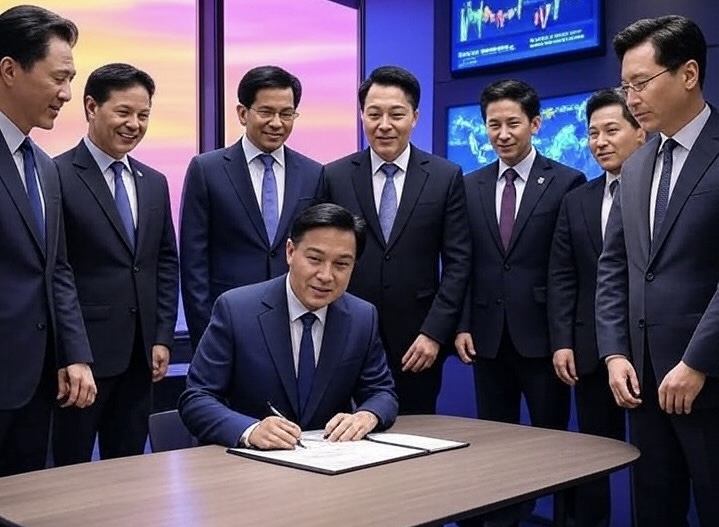
In a bold move signaling a new era for its digital asset industry, South Korea’s government has proposed reclassifying cryptocurrency firms as “venture companies,” granting them access to tax breaks, government subsidies, and financial support previously reserved for traditional startups. Announced on July 9, 2025, by the Ministry of SMEs and Startups, this policy shift aims to integrate crypto businesses into the nation’s innovation ecosystem, reversing a restrictive 2018 law that sidelined them alongside gambling and nightlife sectors.
A Reversal of the 2018 Exclusion
Since 2018, South Korea’s “Act on Special Measures for the Promotion of Venture Businesses” explicitly excluded blockchain-based crypto firms from venture certification, categorizing them as speculative and high-risk. This restriction cost firms dearly—most notably Dunamu, the parent company of Upbit, which lost its venture status and faced an $18 million tax bill after a failed legal challenge.
The proposed amendment seeks to remove virtual asset service providers (VASPs), such as crypto trading platforms and brokerages, from the restricted list. By recognizing these firms as “innovative, business-viable” ventures, the ministry aims to “revitalize and broaden the venture ecosystem” and accelerate industry growth. Public feedback on the proposal is open until August 18, 2025, reflecting a transparent approach to this transformative change.
Benefits for Crypto Firms
Venture company status in South Korea comes with significant perks, including:
- Tax Incentives: Up to a 50% corporate income tax cut for five years and a 75% reduction on business real estate acquisition taxes.
- Financial Support: Access to low-interest loans, grants, and state-backed financing programs.
- Innovation Hubs: Participation in government-led initiatives like the K-Startup Grand Challenge and Pangyo Techno Valley, offering mentorship, funding, and networking opportunities.
- Legitimacy: Enhanced credibility, attracting talent, investors, and global partnerships.
These benefits are expected to lower operational costs, improve liquidity, and spur innovation, positioning South Korean crypto firms as competitive players on the global stage.
Aligning with President Lee’s Pro-Crypto Vision
The reclassification aligns with the crypto-friendly agenda of President Lee Jae-myung, who took office in June 2025. Lee has championed policies to modernize digital asset regulations, including:
- Spot Crypto ETFs: The Financial Services Commission (FSC) submitted a roadmap in June 2025 to approve spot cryptocurrency ETFs by the second half of the year, reversing prior bans due to volatility concerns.
- Won-Based Stablecoins: Lee’s administration is pushing legislation to institutionalize Korean won-pegged stablecoins, prompting trademark filings by major financial institutions.
- Institutional Investment: Plans to lift restrictions on institutional crypto trading and allow the nation’s pension fund to invest up to $884 billion in cryptocurrencies.
These initiatives reflect a broader shift in perception, viewing crypto not as a speculative outlier but as a cornerstone of South Korea’s digital economy.
A Broader Context of Innovation
South Korea’s advanced digital infrastructure, with nationwide 5G coverage and seamless fintech integration, provides fertile ground for crypto innovation. The reclassification is expected to attract venture capital, foster new startups, and create jobs, reinforcing the country’s ambition to become a global tech hub.
However, challenges remain. The government must balance innovation with risk mitigation, given the crypto market’s volatility and a record $2.1 billion in hacks in the first half of 2025. Clear regulations on taxation, consumer protection, and stablecoin frameworks will be critical to sustaining growth.
Industry and Public Sentiment
The proposal has sparked optimism within the crypto community. Posts on X highlight the policy’s potential to “transform Korean crypto landscape” by removing the stigma of the 2018 classification. Industry leaders anticipate increased legitimacy and investment, though some caution that smooth implementation and regulatory clarity are essential.
A Global Signal
South Korea’s move sends a clear message: it aims to lead in global crypto innovation. By embracing digital assets as a legitimate sector, the country is poised to attract international startups and investors, leveraging its tech-savvy infrastructure to drive economic growth. As the public consultation period unfolds, all eyes are on how this policy will shape South Korea’s role in the evolving world of digital finance.
Disclaimer: This article is for informational purposes only and does not constitute financial or investment advice. Readers should verify facts independently and consult professionals before making decisions.
Sources: Cryptonews.com, Crypto.news, TheBlock.co, BitcoinEthereumNews.com, Cointelegraph.com, BeInCrypto.com, Coinpedia.org, AInvest.com, EconoTimes.com, StartupNews.fyi, Biztoc.com



